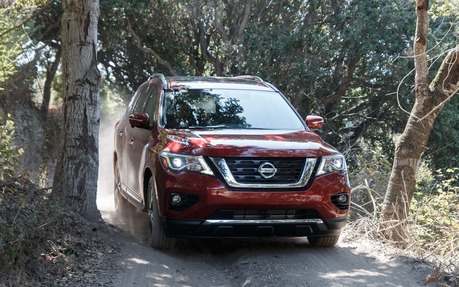2017 Nissan Pathfinder: A Better-Defined Role
While compact and subcompact SUVs are gaining more and more in popularity each year, midsize SUVs are positioned as the new kings of the road. Big, powerful and versatile, the manufacturers of these vehicles are sweating the details to offer the consumer a unique driving experience.
Whether we’re thinking of the Honda Pilot, the Toyota Highlander or even the Kia Sorento, not to mention the domestic brands’ products, there is something for everyone in this segment.
At Nissan, the category’s contender is the Pathfinder. With all due respect to the Japanese brand, let’s just say that the current Pathfinder’s grade wasn’t an “A,” but rather a “C.” Boring, a little unrefined and equipped with a CVT automatic that numbs the driving experience, the SUV rarely scored more than a passing grade in the dozens of automotive publications that review vehicles.
As far as we’re concerned, it wasn’t our favourite choice compared to its aforementioned rivals.
However, for the 2017 model year, things are different. And yet Nissan isn’t launching an all-new Pathfinder. Instead, the manufacturer announced a major refresh, a little like the Sentra that saw 20% of its components replaced last year.
I don’t have the exact number regarding the Pathfinder, but if we look at the long list of improvements, we can easily guess that the proportion of new components is similar to the Sentra’s. Is this refresh a successful one? Yes.

More macho
Every time we get the opportunity to attend a media launch, we almost systematically receive a technical briefing on the new model by the brand’s experts.
Our job essentially consists of sifting through the information to separate what’s right and what’s not, because based on these presentations alone, the vehicles are always the best in the world.
In the Pathfinder’s case, Nissan explained to us that it received an extensive makeover. The 2017 Pathfinder proudly flaunts new styling, a new suspension, a new steering system, a more modern infotainment system as well as a modified powertrain.
That’s a lot of new stuff for a refresh, especially when we realise that these modifications fundamentally change the way the vehicle drives.
First, its styling. Nissan qualified the SUV as now having an “in your face” look. As a matter of fact, the Pathfinder and its squared-off, more truck-ish appearance does look more intimidating. However, is it enough to clearly redefine this vehicle that seemed a little lost in its segment?
Inside, the infotainment system is brilliant. The touch-sensitive controls are intuitive, and we really appreciate the information screen located between the driver instrument panel gauges.
From a technological standpoint, the 2017 Nissan Pathfinder benefits from the same suite of electronic safety driving aids that the company installs in most of their vehicles, and we must admit that it all works beautifully. Using a host of sensors and cameras, this system detects all the objects that could collide with the vehicle, automatically modifying your speed and trajectory to avoid them.

The best is invisible
Yes, the best part about the 2017 Pathfinder is what you don’t see.
For example, we’re talking about a suspension setup that’s stiffer by 11% up front and 7% at the rear. These numbers may sound insignificant, and yet they greatly enhance the vehicle’s handling. Add a more precise steering system, and although the Pathfinder hasn’t become a sporty vehicle, its road manners are much more refined on the highway and on twisty roads.
The 3.5-litre V6 engine new produces 284 horsepower—instead of 260—and 259 lb.-ft. of torque. However, these 24 extra ponies make the drive livelier and deliver quicker acceleration times, in addition to increasing its towing capacity. While the Honda Pilot and the Toyota Highlander can tow up to 5000 lbs. (2268 kg), the Pathfinder can now pull a load of up to 6000 lbs. (2722 kg). That also means a 5000-lb. load is easier to manage, so if you use a midsize SUV to haul a small boat or a trailer, the Pathfinder suddenly becomes much more interesting. In addition, it includes one of the most versatile all-wheel-drive systems on the market, along with the Jeep Grand Cherokee’s 4x4 system.
With this update, Nissan has given the Pathfinder a more-defined role. In the midsize SUV segment, it’s the one that allow us to carry more stuff on less beaten paths.
If we’re only planning to drive around town with our SUV, the Pathfinder will do so comfortably, as well as its rivals can do, as a matter of fact. It’s up to us to decide which one we prefer.
| Test drive report | |
| Test model | 2017 Nissan Pathfinder |
|---|---|
| Trim level | Platinum 4WD |
| Price range | $31,198 – $46,998 |
| Price as tested | 46 998 $ |
| Warranty (basic) | 3 years/60,000 km |
| Warranty (powertrain) | 5 years/100,000 km |
| Fuel economy (city/highway/observed) | 12,1 / 8,9 / 10,0 L/100km |
| Options | N/A |
| Competitive models | Ford Explorer, Honda Pilot, Jeep Grand Cherokee, Mazda CX-9, Toyota 4Runner, Toyota Highlander |
| Strong points |
|
| Weak points |
|
| Editor's rating | |
| Fuel economy | With an average of 10 L/100 km, it’s within the category average |
| Comfort | Comfortable and pretty quiet inside |
| Performance | Despite the power increase, the CVT automatic’s operation makes the accelerations inconsistent |
| Infotainment | Modern (finally) and completely functional |
| Driving | the Pathfinder doesn’t benefit from a sporty character, but that’s not important for the segment’s typical buyers |
| Overall | No major shortcomings here, and with its newfound capacities, it can now stand out in the midsize SUV crowd |
